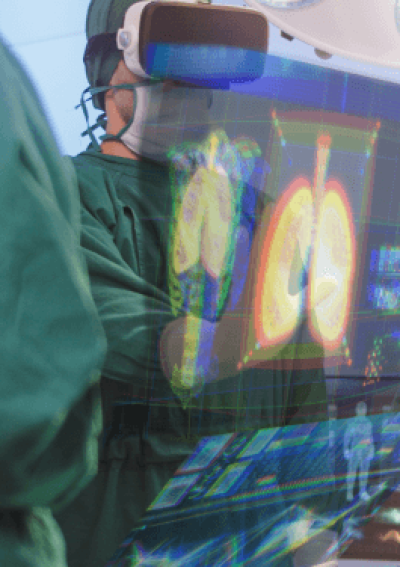Silicosis Treatment
There is no cure for silicosis, but supportive treatments including bronchodilators, cough medicines and supplemental oxygen can help manage and relieve symptoms. Antibiotics may be prescribed for co-occurring bacterial infections. Eliminating further silica exposure helps prevent further damage.

Silicosis Treatment Options
There is no cure for silicosis, but there are treatment options available to address disease symptoms such as coughing, shortness of breath and weakness. These can drastically improve patients’ quality of life. In very rare cases, a lung transplant can extend survival and improve quality of life.
Silicosis is permanent, irreversible lung damage from long-term exposure to silica dust. Removing the source of silica exposure can protect against further damage and avoid exacerbation of symptoms.
Supportive Treatments
Supportive or palliative treatments for silicosis manage specific symptoms. Relieving symptoms such as coughing or shortness of breath can improve comfort.
Bronchodilators, for example, can make breathing easier. There are three main types of bronchodilators: Beta-2 agonists and anticholinergics that are typically administered with an inhaler and Theophylline, which is a tablet.
- Antibiotics: Silicosis can increase the risk of respiratory infections, so careful monitoring and timely treatment with antibiotics are critical.
- Bronchodilators: Both short- and long-acting bronchodilators can help relax lung muscles and widen airways.
- Cough Medicine: Cough suppressants provide relief from the chronic cough that typically accompanies silicosis.
- Immunizations: Vaccinations against influenza and pneumonia can help prevent these respiratory infections.
- Pulmonary Rehabilitation: This medically supervised rehabilitation utilizes special breathing exercises. It can help individuals with lung disease breathe better.
- Supplemental Oxygen: Patients with severe disease may benefit from supplemental oxygen during exercise or, eventually, while at rest.
Individual patients may benefit from a combination of these treatments depending on displayed symptoms and their severity. Care also includes fighting secondary infections and reducing risks of complications. Avoiding respiratory illnesses is particularly critical in silicosis patients whose lung function is already compromised.
Eliminating exposure to silica dust can help prevent further damage and lessen the disease’s progression. Workplace protections such as wearing respirators and avoiding bringing home dust-covered clothing and gear can help limit silica dust exposure for workers and their families.
Whole Lung Lavage
Whole lung lavage is a procedure that uses a saline solution to flush out the lungs. Sometimes called lung washing, it removes debris and damaged cells from within the lungs.
Patients receive general anesthesia during the procedure. A pulmonary specialist then inserts a thin tube into one lung. Using a bronchoscope to view the lung’s interior, saline solution is added to bathe the lung. The fluid is collected as it drains to ensure its complete removal.
Because general anesthesia is used, it’s typically preferred to perform whole lung lavage on both lungs at once. Patients may experience coughing as the lungs finish clearing and need supplemental oxygen for a few days after the procedure.
Studies have shown whole lung lavage to be effective for short-term symptom relief, though more research is needed. One research team in Australia is currently looking at using whole lung lavage to rinse silica crystals from the lungs of affected individuals as a possible early-stage silicosis treatment.
Medications
Physicians use several medications to address silicosis. Many of these were originally developed to treat other types of lung disease or fibrosis. Because they continue to demonstrate effectiveness in treating silicosis, they’re widely used.
Silicosis medications can disrupt the scarring process from silica dust in the lungs. Doctors weigh each patient’s medical history and overall health before choosing an appropriate treatment.
- Metformin: This diabetes drug shows promise in modulating inflammatory responses. Current research suggests it may help inhibit silica-induced pulmonary fibrosis.
- Nintedanib: A kinase inhibitor, this drug blocks the action of enzymes that cause fibrosis. Doctors use it to treat several types of lung disease.
- Pirfenidone: In the pyridones class of medications, pirfenidone is used to treat idiopathic pulmonary fibrosis. It blocks the body’s response to harmful particles trapped in the lungs.
- Tetrandrine: Approved as a treatment for silicosis in China, tetrandrine may inhibit inflammation, improving lung function. Some research indicates it helps slow the progression of silicosis.
Patients may be treated with one or more of these medications. These treatments have demonstrated effectiveness in helping to improve lung function and slow disease progression.
Lung Transplant Surgery
Lung transplant surgery is a well-established treatment option for several late-stage lung diseases. It can be an effective treatment for some eligible patients with end-stage silicosis.
During the procedure, a surgeon removes a patient’s lungs and replaces them with healthy donor lungs. While avoiding silica dust exposure will protect the new lungs from developing silicosis, conditions specific to the disease, such as excess bleeding and unstable blood flow, may complicate the procedure and recovery process.
Lung transplantation is a complex procedure that comes with many risks and a complex set of requirements that recipients must adhere to for the rest of their lives. Patients must be fully aware of the risks and requirements before committing to the procedure.
Are Natural Treatments Effective for Silicosis?
Lifestyle changes can be an effective natural silicosis treatment. Quitting smoking can greatly improve lung function and a nutritious diet can benefit overall health. Because silicosis limits lung function, patients should always discuss any new exercise program with their doctor before starting.
Limited animal studies show some natural compounds might slow fibrosis, for example, an orchid extract (bletilla striata polysaccharide), amino acids, flavonoids and oleanolic acid (in olive and grapeseed oils). However, the FDA doesn’t regulate supplements as medications and cautions: “Vitamins, minerals, herbs, and other dietary supplements are not FDA-approved to treat or prevent disease.”
Patients may explore natural remedies for a number of reasons, including the high cost of medical treatment. The economic impact of treatment and lost wages are leading a growing number of workers exposed to silica dust and diagnosed with silicosis to file silicosis lawsuits seeking financial compensation for silica exposure.
Health Risks for People With Silicosis
People diagnosed with silicosis are at increased risk of developing tuberculosis compared to the general public. Receiving a TB vaccine may reduce this risk.
Silica particles increase the replication of a bacteria (Mycobacterium tuberculosis) that likely contributes to increased susceptibility to TB. Additionally, studies of rats with silicosis suggest silicosis severity negatively affects the ability to fight off TB infection.
Additional health risks associated with a silicosis diagnosis include chronic obstructive pulmonary disease, kidney disease and pulmonary hypertension. Patients should discuss concerns about these conditions with their healthcare provider to develop an appropriate preventative plan.
11 Cited Research Articles
Consumernotice.org adheres to the highest ethical standards for content production and references only credible sources of information, including government reports, interviews with experts, highly regarded nonprofit organizations, peer-reviewed journals, court records and academic organizations. You can learn more about our dedication to relevance, accuracy and transparency by reading our editorial policy.
- Wen-hong, W. et al. (2023, February 17). Clinical efficacy of tetrandrine in artificial stone-associated silicosis: A retrospective cohort study. Retrieved from https://www.frontiersin.org/articles/10.3389/fmed.2023.1107967
- Li, R., Kang, H. & Chen, S. (2023). From Basic Research to Clinical Practice: Considerations for Treatment Drugs for Silicosis. Retrieved from https://doi.org/10.3390/ijms24098333
- Xuedan, D. et al. (2022, September 12). Lysophosphatidylcholine acyltransferase 1 alleviates silica-induced pulmonary fibrosis by modulating lipid metabolism, Biomedicine & Pharmacotherapy. Retrieved from https://doi.org/10.1016/j.biopha.2022.113638
- The American Society of Health-System Pharmacists. (2022, June 15). Pirfenidone. Retrieved from https://medlineplus.gov/druginfo/meds/a615008.html
- Li, T. et al. (2022, April 25). Early Identification, Accurate Diagnosis, and Treatment of Silicosis. Retrieved from https://doi.org/10.1155/2022/3769134
- National Institute of Health. (2022, March 24). Pulmonary Rehabilitation. Retrieved from https://www.nhlbi.nih.gov/health/pulmonary-rehabilitation
- NHS. (2021, July 1). Silicosis. Retrieved from https://www.nhs.uk/conditions/silicosis/
- McEwen, K. & Lyndell, B. (2021, February 10). Lung transplantation for silicosis and recovery: an Australian case study. Retrieved from https://doi.org/10.12968/bjon.2021.30.3.178
- Lanzafame, M. & Vento, S. (2021). Mini-review: Silico-tuberculosis. Journal of clinical tuberculosis and other mycobacterial diseases. Retrieved from https://doi.org/10.1016/j.jctube.2021.100218
- Metro North Health. (2020, November 24). World-first treatment for silicosis underway at The Prince Charles Hospital. Retrieved from https://metronorth.health.qld.gov.au/news/world-first-treatment-silicosis-tpch
- The American Society of Health-System Pharmacists. (2020, May 15). Nintedanib. Retrieved from https://medlineplus.gov/druginfo/meds/a615009.html
Calling this number connects you with a Consumer Notice, LLC representative. We will direct you to one of our trusted legal partners for a free case review.
Consumer Notice, LLC's trusted legal partners support the organization's mission to keep people safe from dangerous drugs and medical devices. For more information, visit our partners page.
855-842-1699
